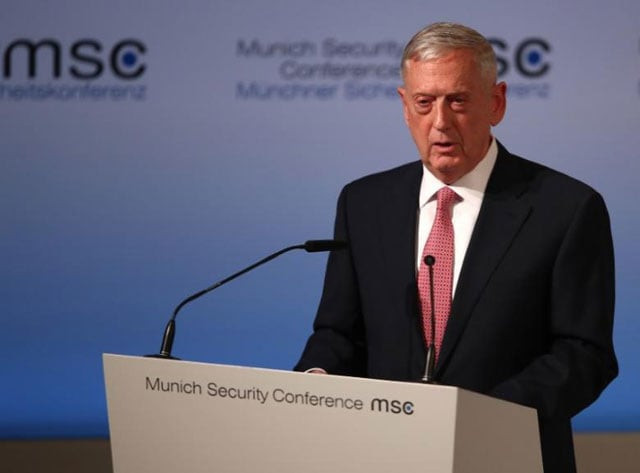Talking point with Mattis: fair burden sharing
Afghanistan, terrorism also on agenda for meetings with US defence secretary

US Defence Secretary Jim Mattis. PHOTO: FILE
The visit by the Pentagon chief is a follow-up of ongoing engagements between Islamabad and Washington in order to find a way out of the current impasse.
Mattis will meet Prime Minister Shahid Khaqan Abbasi and Army Chief General Qamar Javed Bajwa to discuss the current situation of Afghanistan and how the two countries can best cooperate with each other to bring some semblance of normalcy.
Officials admit the task is not easy as the two ostensible allies are struggling to put their act together since President Donald Trump announced a new strategy for Afghanistan and South Asia in August.
The Trump administration takes a critical view of Pakistan’s fight against terrorism as the US is increasingly upset over what it considers Islamabad’s lack of determination to go after Afghan-affiliated Haqqani network and anti-India militant outfits.
Jim Mattis to visit Pakistan on Dec 4 for talks with civil-military leadership
Islamabad has stoutly rejected the US strategy insisting that the country cannot be held responsible for the lingering conflict in the war-ravaged country.
At the last briefing, Foreign Office spokesperson Dr Muhammad Faisal admitted that there was a ‘perception gap’ between Pakistan and the US. He said the two countries were talking to each other to bridge that perception gap.
A senior Pakistani official, who is directly involved in the policy making on the Pak-US relations, told The Express Tribune that the two sides have yet to come up with common strategy to deal with Afghanistan problem.
At the heart of their differences is how to end the stalemate in Afghanistan where the US after over 16 years of military campaign could not defeat the Afghan Taliban.
In fact, recent reports suggest that the insurgents have gained significant ground and hold large swaths of territory since they were overthrown in the military campaign after 9/11 attacks in the United States.
Washington believes that the main reason the Taliban have not yet been defeated is due to the support they receive from Pakistan. The US is specifically concerned about Pakistan’s alleged support to the Haqqani Network, which has carried out some of the devastating attacks targeting the US-led foreign forces.
Strategic pivot of Pakistan-US relationship
Islamabad, however, is adamant that there is no organised presence of any military outfits since its successful military campaign in the tribal areas bordering Afghanistan.
Pakistan insists that the Taliban or the Haqqani network do not need any support base on its soil given the fact that they control nearly 50 per cent of the Afghan territory.
The US, however, is far from convinced. Just ahead of the visit of the defence secretary, the top US commander leading the foreign forces in Afghanistan claimed that despite threats and the new strategy by the Trump administration, Pakistan has yet to change its approach in the fight against terrorism.
A senior Foreign Office official acknowledged the difference of opinion but insisted that cooperation between the two countries were essential to bring durable peace and stability in Afghanistan.
The visit of Mattis, the official hoped, might help pave the way for some workable mechanism between the two sides to address each other’s concerns.
Pakistan’s main worry of Trump’s new approach is its efforts to give greater role to India in Afghanistan, something that Islamabad fears would surely exacerbate regional tensions.
Talks with US to bridge gap in perceptions: FO
Islamabad is already wary of India’s growing footprint in Afghanistan. Officials have publically accused Indian secret services of using the Afghan soil to create subversive activities in Pakistan.
“All issues are on the table. The US may have its own list of demands but Pakistan has genuine grievances too,” the official said but insisted that Islamabad wants to iron out differences with the US through talks.
“There is no room for any confrontation. Both sides need each other and that’s something on which we can build our relationship,” the official stressed.



















COMMENTS
Comments are moderated and generally will be posted if they are on-topic and not abusive.
For more information, please see our Comments FAQ